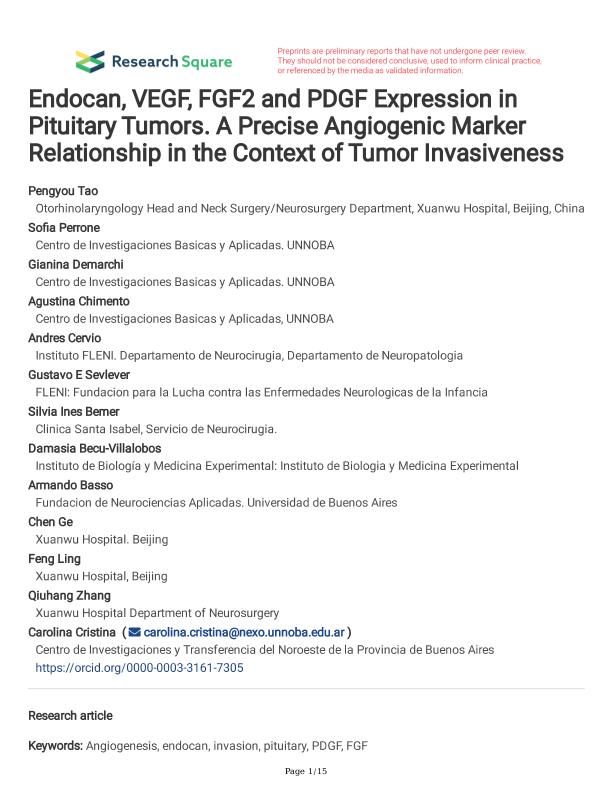Artículo
Endocan, VEGF, FGF2 and PDGF Expression in Pituitary Tumors: A Precise Angiogenic Marker Relationship in the Context of Tumor Invasiveness
Tao, Pengyou; Perrone, Sofía ; Demarchi, Gianina
; Demarchi, Gianina ; Chimento, Agustina; Cervio, Andres Eduardo; Sevlever, Gustavo; Berner, Silvia Ines; Becu, Damasia
; Chimento, Agustina; Cervio, Andres Eduardo; Sevlever, Gustavo; Berner, Silvia Ines; Becu, Damasia ; Basso, Armando J.
; Basso, Armando J. ; Ge, Chen; Ling, Feng; Zhang, Qiuhang; Cristina, Silvia Carolina
; Ge, Chen; Ling, Feng; Zhang, Qiuhang; Cristina, Silvia Carolina
 ; Demarchi, Gianina
; Demarchi, Gianina ; Chimento, Agustina; Cervio, Andres Eduardo; Sevlever, Gustavo; Berner, Silvia Ines; Becu, Damasia
; Chimento, Agustina; Cervio, Andres Eduardo; Sevlever, Gustavo; Berner, Silvia Ines; Becu, Damasia ; Basso, Armando J.
; Basso, Armando J. ; Ge, Chen; Ling, Feng; Zhang, Qiuhang; Cristina, Silvia Carolina
; Ge, Chen; Ling, Feng; Zhang, Qiuhang; Cristina, Silvia Carolina
Fecha de publicación:
20/01/2021
Editorial:
Editors Advisory Group
Revista:
BMC Endocrine Disorders
ISSN:
1472-6823
Idioma:
Inglés
Tipo de recurso:
Artículo publicado
Clasificación temática:
Resumen
Background: Pituitary adenomas can become invasive and aggressive, and in turn produce tumor recurrence. Endocan or endothelial cell specific molecule-1 (ESM1) has been associated with angiogenesis and tumor growth in gliomas, and lung, kidney, liver among other cancers, but there is a scarcity of information regarding its role in pituitary adenomas. In the search for biomarkers of tumor behavior our objective was to determine the relationship between endocan (ESM1) mRNA expression and cavernous sinus invasion, and its association with gene expression of VEGF, FGF2 and PDGF angiogenic factors in human pituitary adenomas.Methods: ESM1, VEGF, FGF2 and PDGF expression was determined by qRT-PCR in 28 pituitary tumor samples and tumor invasion was determined by the Knosp grade classification. Results were associated with clinical data.Results: We found that ESM1 was expressed in 75% of the tumors. FGF2 expression was higher in ESM1-positive compared to ESM1-negative tumors, and a significant negative correlation in the expression of FGF2 and PDGF was found. Although ESM1 expression did not show any differences in invasive and non-invasive tumors, a positive correlation between ESM1 and Knosp grade was reached when grade 0-3 tumors were considered, suggesting its participation in the initial periods of tumor invasion. Finally, no difference in ESM1 expression was found between functioning and non-functioning adenomas, or patients age.Conclusions: Our study points to a precise pattern of angiogenic factor expression in pituitary tumors, and its relation to invasive behavior, which should be considered in the tailoring of drug treatments for aggressive and resistant pituitary adenomas.
Palabras clave:
ANGIOGENESIS
,
ENDOCAN
,
INVASION
,
PITUITARY
,
PDGF
,
FGF
Archivos asociados
Licencia
Identificadores
Colecciones
Articulos(SEDE CENTRAL)
Articulos de SEDE CENTRAL
Articulos de SEDE CENTRAL
Citación
Tao, Pengyou; Perrone, Sofía; Demarchi, Gianina; Chimento, Agustina; Cervio, Andres Eduardo; et al.; Endocan, VEGF, FGF2 and PDGF Expression in Pituitary Tumors: A Precise Angiogenic Marker Relationship in the Context of Tumor Invasiveness; Editors Advisory Group; BMC Endocrine Disorders; 2021; 20-1-2021; 1-15
Compartir
Altmétricas



